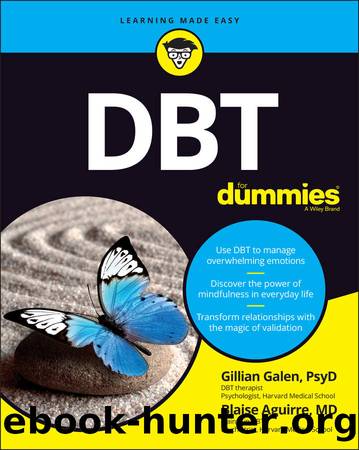DBT For Dummies by Blaise A. Aguirre

Author:Blaise A. Aguirre [Aguirre, Blaise A.]
Language: eng
Format: azw3
ISBN: 9781119730163
Publisher: Wiley
Published: 2021-04-13T00:00:00+00:00
Before you begin: Setting parameters
There are very specific parameters around coaching, which youâll discuss in detail with your therapist. For example, there is some variation in the hours during which your therapist will be on call; this can range from 24 hours a day, seven days a week, to a schedule that could look like 8 a.m. to 9 p.m. daily. When the hours are more restricted, your therapist will give you instructions for alternative places to access help should you need it.
In addition to talking to your therapist about the hours you can call for coaching, you should also review what is expected. One important question to ask is whether you can text for coaching. Therapists have mixed feelings about this, so itâs important to clarify. When we meet with our new patients, we orient them to the hours we are available as well as our expectations. For example, we require that before calling for coaching, our patients try at least one skill on their own. Often these skills come from skills plans that you complete in a session.
We also orient patients that once they call, they are making the commitment, to the best of their ability, to refrain from engaging in a problematic behavior until we return the call. This may be one of the more challenging agreements because weâll likely answer the call or text; however, there will be times when it takes your therapist some time to get back to you. You should have a plan for what you can do while youâre waiting for your therapist to call you back. Typically, youâll find distress tolerance crisis survival skills (discussed in Chapter 11) to be helpful while you wait.
When your therapist calls you back, they will ask you to give them a brief explanation of the situation and what you need help with. Your therapist will ask you what skills youâve tried and then suggest a series of skills to do. Another agreement we ask for is that you be open to the skills suggestions and not say ânoâ to everything your therapist suggests. Be open minded even if itâs hard. If you think one or more of the skills may not work given where you are or what you have access to, you should actively collaborate with your skills coach to make a plan that you feel will be helpful.
It isnât uncommon for your therapist to ask you what has worked in the past. Sometimes when you get emotionally dysregulated, itâs hard to remember which skills work. Hearing your therapist ask can, at times, help you regulate you emotions, feel calmer, think more clearly, and remember which skills have been effective in the past. This is very common and is called co-regulation. Once youâve agreed to the series of skills, you and your therapist will problem-solve any barriers that could get in the way of following your skills plan, and then youâll end the call. A lot of focused work can happen in a short coaching session.
Download
This site does not store any files on its server. We only index and link to content provided by other sites. Please contact the content providers to delete copyright contents if any and email us, we'll remove relevant links or contents immediately.
Rewire Your Anxious Brain by Catherine M. Pittman(18655)
Talking to Strangers by Malcolm Gladwell(13370)
The Art of Thinking Clearly by Rolf Dobelli(10489)
Mindhunter: Inside the FBI's Elite Serial Crime Unit by John E. Douglas & Mark Olshaker(9343)
Becoming Supernatural by Dr. Joe Dispenza(8217)
Change Your Questions, Change Your Life by Marilee Adams(7783)
Nudge - Improving Decisions about Health, Wealth, and Happiness by Thaler Sunstein(7707)
The Road Less Traveled by M. Scott Peck(7603)
The Lost Art of Listening by Michael P. Nichols(7506)
Mastermind: How to Think Like Sherlock Holmes by Maria Konnikova(7347)
Enlightenment Now: The Case for Reason, Science, Humanism, and Progress by Steven Pinker(7313)
Win Bigly by Scott Adams(7199)
The Way of Zen by Alan W. Watts(6614)
Daring Greatly by Brene Brown(6514)
Big Magic: Creative Living Beyond Fear by Elizabeth Gilbert(5773)
Grit by Angela Duckworth(5615)
Ego Is the Enemy by Ryan Holiday(5450)
Men In Love by Nancy Friday(5240)
The Laws of Human Nature by Robert Greene(5208)
